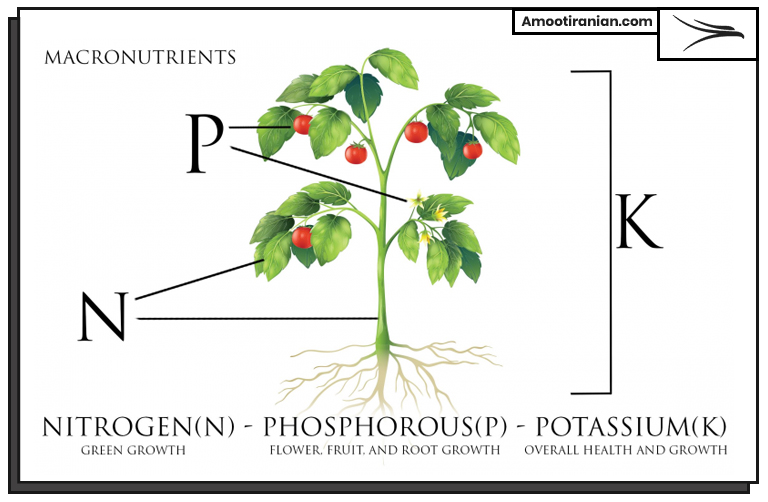.

.
NPK!
The three main types of fertilizers are commonly known as NPK fertilizers, which stands for:
- Nitrogen
- Phosphorus
- Potassium
Each of these nutrients plays a critical role in plant growth and development.
.
Nitrogen

Nitrogen is one of the most important nutrients for plant growth and development, and it plays a critical role in many different physiological processes.
.
Some of the key benefits of nitrogen for plant growth and development include:
1_ Chlorophyll production: Nitrogen is an essential component of chlorophyll, the pigment that gives plants their green color and is necessary for photosynthesis. Without sufficient nitrogen, plants cannot produce chlorophyll, which can result in stunted growth and reduced yields.
2_ Plant growth and development: Nitrogen is required for the formation of amino acids, which are the building blocks of proteins. Proteins are essential for the growth and development of plant tissues, including leaves, stems, and roots.
3_ Improved yield and quality: Adequate nitrogen levels can result in increased plant growth and yield, as well as improved quality characteristics such as increased protein content in crops like wheat and corn.
4_ Enhanced photosynthesis: Nitrogen is important for the functioning of the enzymes involved in photosynthesis, which is the process by which plants convert sunlight into energy.
5_ Resistance to stress: Nitrogen can help plants resist stress from factors such as drought, cold temperatures, and disease.
.
Overall, nitrogen is an essential nutrient for plant growth and development, and plays a critical role in many different physiological processes.
However, it is important to apply nitrogen fertilizers in a responsible and sustainable manner to minimize environmental impacts such as eutrophication of water bodies and greenhouse gas emissions.
.
Phosphorus

Phosphorus is an essential nutrient for plant growth and development, and it plays a critical role in many different physiological processes.
.
.
.
.
Some of the key benefits of phosphorus for plant growth and development include:
1_ Strong root development: Phosphorus is necessary for the development of strong, healthy roots. This is because phosphorus is important for cell division and growth, which are necessary for root elongation and branching.
2_ Flower and fruit development: Phosphorus is essential for the development of flowers and fruits. It is necessary for the transfer of energy within the plant, which is necessary for the development of reproductive structures.
3_ Improved yield and quality: Adequate phosphorus levels can result in increased plant growth and yield, as well as improved quality characteristics such as increased sugar content in crops like grapes and strawberries.
4_ Resistance to stress: Phosphorus can help plants resist stress from factors such as drought, disease, and pests. It is important for maintaining the health and vigor of plants, especially under adverse growing conditions.
5_ Enhanced photosynthesis: Phosphorus is necessary for the functioning of the enzymes involved in photosynthesis, which is the process by which plants convert sunlight into energy.
Overall, phosphorus is an essential nutrient for plant growth and development, and plays a critical role in many different physiological processes.
However, it is important to apply phosphorus fertilizers in a responsible and sustainable manner to minimize environmental impacts such as eutrophication of water bodies and soil degradation.
.
Potassium

Potassium is an essential nutrient for plant growth and development, and it plays a critical role in many different physiological processes.
.
.
.
.
.
Some of the key benefits of potassium for plant growth and development include:
1_ Water regulation: Potassium helps regulate water uptake and transport within the plant, which is essential for maintaining turgor pressure and preventing water stress. This is especially important during periods of drought or waterlogging.
2_ Stomata regulation: Potassium is necessary for regulating the opening and closing of stomata, which are the small pores on leaves that allow for gas exchange. This is important for maintaining optimal levels of carbon dioxide and oxygen within the plant, as well as for water conservation.
3_ Improved yield and quality: Adequate potassium levels can result in increased plant growth and yield, as well as improved quality characteristics such as increased sugar content in crops like sugar beets and citrus fruits.
4_ Resistance to stress: Potassium can help plants resist stress from factors such as drought, heat, and disease. It is important for maintaining the health and vigor of plants, especially under adverse growing conditions.
5_ Improved nutrient uptake: Potassium can help improve the uptake and utilization of other essential nutrients such as nitrogen and phosphorus, which can result in improved plant growth and yield.
.
Overall, potassium is an essential nutrient for plant growth and development, and plays a critical role in many different physiological processes.
However, it is important to apply potassium fertilizers in a responsible and sustainable manner to minimize environmental impacts such as salinization of soil and water resources.
.
NPK fertilizers contain varying ratios of these three essential nutrients, depending on the specific needs of the plants and soil conditions.
In addition to NPK fertilizers, there are also other types of fertilizers that contain other essential plant nutrients, as well as micronutrients, which are necessary in smaller quantities for plant growth and development.
